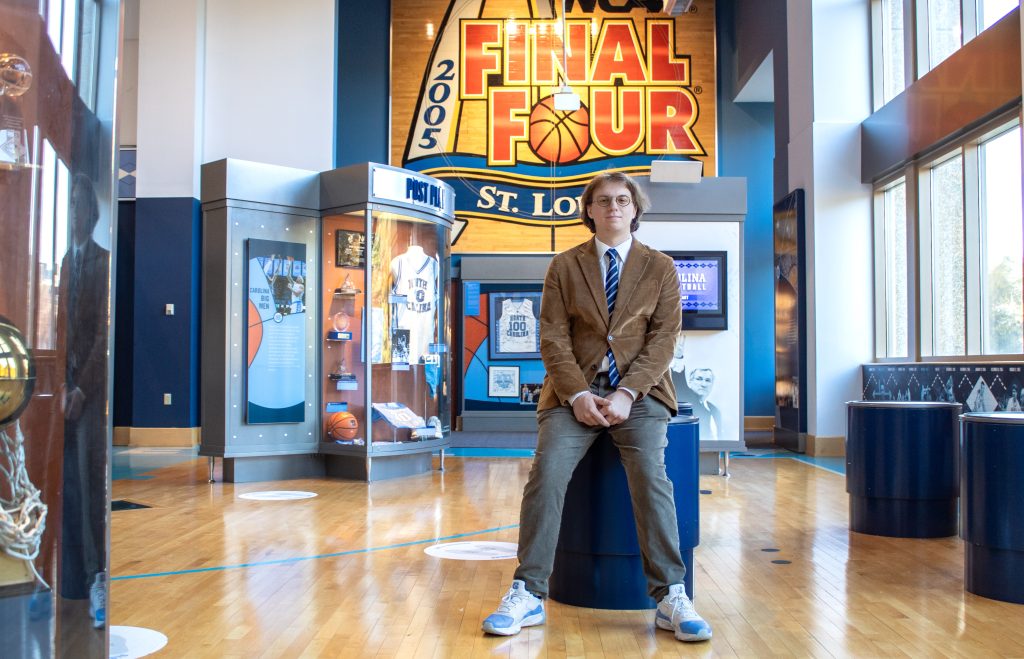College Up Close: Conor Kerr, statistics and operations research
A junior, Kerr founded the Sports Analysis Intelligence Laboratory to connect undergraduates with a passion for statistics with opportunities through Carolina Athletics

On basketball game days at Carolina, Conor Kerr is always close to the action.
Since his first year at UNC, Kerr, a junior from Wilmington, has worked with the men’s varsity basketball team as a student statistician. It is a role he helped to create at UNC, one that bridges research and athletics to provide Carolina’s coaching staff and players with pivotal information to help improve performance on and off the court.
He first had the idea to pursue sports research with Carolina Athletics before he was officially a Tar Heel.
“I wanted to make an immediate impact on my community,” said Kerr, a double major in statistics and analytics and economics with a mathematics minor in the College of Arts and Sciences.
While he was considering his admissions decision, he asked the Office of Undergraduate Admissions to connect him with athletics teams who might be interested in working with an undergraduate statistician. It wasn’t long before the men’s basketball staff gave him a call.
That possibility sealed the deal on attending Carolina, he said.
Under the supervision of Doug Halverson, head athletic trainer, and members of the men’s basketball staff, Kerr began working with data from the team.
“It started slowly,” Kerr said. The team provided him with data from the summer, and his first projects focused on scouting, or evaluating players’ and the team’s overall strengths and areas of improvement. But as his role and the season progressed, he realized that player performance was his main area of interest.
With the help of Halverson and members of the departments of exercise and sport science and statistics and operations research, Kerr began to research the possible effects of players’ training intensity and load on game day performance. He used metrics from wearable accelerometers — small sensors that collect player data like sprints, jumps and stops in real time as they practice — to analyze the effects of practice time and movement intensity on game outcomes.
Kerr found that the data supported a short, intense practice the day before a game and a longer, less intense practice two days before game day.
The findings, which he presented last spring at the Office for Undergraduate Research’s Celebration of Undergraduate Research, and the possibility to expand on the research excited Kerr.
“As I’ve taken more statistics classes, I’ve been able to apply that to men’s basketball,” he said. He was also able to repeat the research with the women’s varsity basketball team, which he has worked with since the summer before his sophomore year.
“People thought, ‘Women’s [basketball] might be different; you might find different stats,’” Kerr said. “It was cool to see the same story.”
Kerr is quick to note that his research could not be done alone.
Through his work with Carolina Athletics, Halverson has helped to guide Kerr through team processes, networking and much more.
“I have learned a lot about basketball, sport science and professional life from Doug, and I am incredibly proud to call him a mentor,” Kerr said, adding that he is deeply grateful for Halverson’s interest in students’ skills and passions.
In the department of statistics and operations research, Mario Giacomazzo, teaching assistant professor, has been a mentor in and out of the classroom. It was Giacomazzo, Kerr remembers, who first encouraged the creation of a formal program to expand undergraduate sports analysis opportunities to fellow Tar Heels.
Through Kerr’s passion and hard work and the support of Giacomazzo, Halverson and Ph.D. student Andy Ackerman, the Sports Analysis Intelligence Laboratory (SAIL) was officially founded in 2022 and became a formal tie between Carolina statistics and athletics.
“We were lucky to find five incredibly impressive and eager undergraduate students to help start the group,” said Kerr.
In addition to both varsity basketball teams, the program has begun working with varsity swimming and diving, women’s varsity tennis and the Applied Physiology Laboratory in the department of exercise and sport science, including Abbie Smith-Ryan, professor of exercise physiology, and doctoral student Sam Moore.
SAIL has also added two graduate students and a faculty member to their team and is currently accepting applications for additional undergraduate sports analysts.
After he graduates in 2025, Kerr plans to pursue a master’s and Ph.D. in economics and to “lead a life of public service through creative research and make a positive impact on those in my community.”
SAIL, he hopes, can make a similarly positive and long-lasting impact.
“I hope that as the group continues to grow it will become something of a staple within UNC, where people from all over the university can come to collaborate on top-notch analytical research in sports.”
By Jess Abel, College of Arts and Sciences
Tar Heels of the Week are nominated by professors in their department. Follow us on Instagram to explore more College Up Close.
